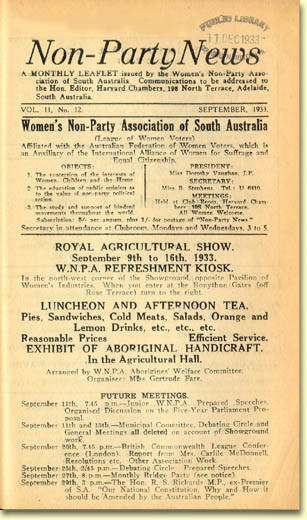
Political Awareness | In Parliament | The Workplace | Why South Australia?
The Aboriginal Voice | Cultural Diversity

 Equal
opportunities for men and women
Equal
opportunities for men and women
The term equal opportunity is generally considered to be an expression of recent developments: however, it was used in 1929 and obviously was in currency long before that. This item appeared on page 9 of the Non-Party News of July 1929, the newsletter of the Women's Non Party Political Association. It is an interesting newsletter. "The opening of all offices and employments to men and women equally" is part of plank 3 on the W.N.P.A. platform.
"The cry of "Equal opportunity, regardless of sex" is not new to the ear of the present generation. Like the term Democracy, of which it is a part, it has become daily speech, being generally accepted or denounced without any particular investigation as to its real meaning, whence it came, how it has grown, and whither it is bound.
Similarly to many other present problems, this demand for equality of opportunity has its roots in the Industrial Revolution. Prior to the invention of machinery and the centralization of industry in factories, living was a much simpler thing than it is now. The village or group of villages around a manor was practically a self-sustained unit. The work of the woman in the preparation of household necessities, crude though it often was, provided her with as wide a scope of activities, and gave her as definite an economic value, as those possessed by men.
But with the development of machinery the production of a very large portion of domestic needs passed from the home to the factory, while the horizon of communal life grew from village to town, from town to nation, and still beyond.
The early chapters of this change make particularly unpleasant reading, but from its worst aspect to the tremendously improved outlook of the present time, women, either through necessity or from choice, have been entering factory and shop, skilled trades and business occupations, educational and professional fields in ever-increasing proportion.
And it is in part the success of women in certain directions that has fostered the claim for an open field unhampered by artificial sex restrictions. Fundamentally this demand for equality cannot be an advocacy for favours. It is rather a searching revelation of limitations, a test of fitness, an opportunity for ability great or small, to find its natural level. It is indeed the desire common to all mankind to have the opportunity for self-expression according to native endowment.
But there is yet another aspect of this claim, equally as important. It is not the right to receive, but the urgency to give. This particularly applies to communal life, for even as the provision for the body has passed from the hearth to the factory, so the care for the mind and soul has reached out from the comparatively simple demands of the village to the complex relations of international activity.
So we find women urging the necessity for a voice in the making and administering of laws, asking for a seat in councils, seeking a place on all bodies of a social and philanthropic nature. We even hear rumours of their intention to claim positions of authority in the Civil Services!
They are not seeking a monopoly, but, having seen the fruits of one sex control, they more urgently request co-operation. For it is a world of men and women, male and female. Each presents its problems, each may contribute towards their solution.
So it is that women demand, and will continue to demand, the perfectly rational right of opportunity, equal with that held by men, both in the doing of the world's work from the ordering of its social activities."

| Copyright and this website | Disclaimer | Privacy | Feedback | Accessibility | FOI This page last updated on Friday 11 April, 2014 14:46
|
State Library of South Australia |